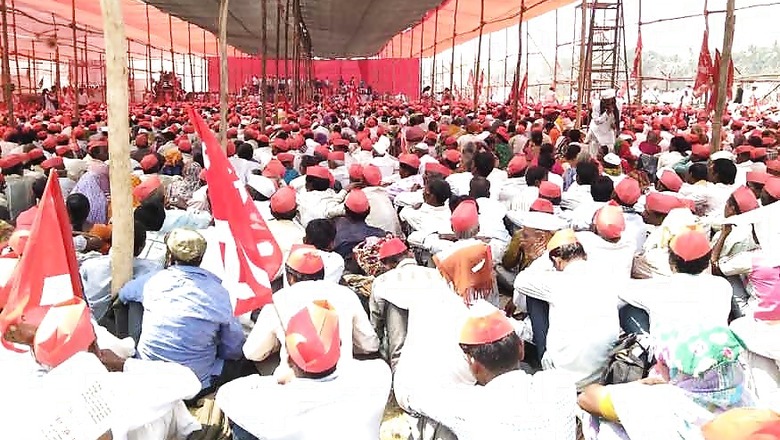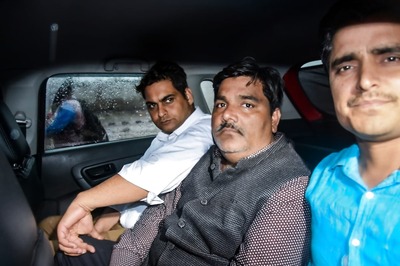
views
New Delhi: It's not often that you see thousands of farmers walking even at night, some barefoot, to claim their "legitimate right". Walking over six days from Nashik and travelling for over 180 km, the farmers are in Mumbai now.
Over 40,000 farmers, led by the Left-affiliated All India Kisan Sabha, have a demand which is a tad different from those made by other farmer organisations.
Apart from the loan waiver and better Minimum Support Price, these farmers want the implementation of the Forest Rights Act to secure the rights of the people working on community lands and to help the farmers secure loans to opt for basic irrigation facilities.
News18 takes a detailed look at this demand:
What is the Forest Rights Act, 2006?
India is home to millions who drive their sustenance from India's forest lands but could never claim any legal right over their homes or lands they worked on. Scheduled Tribes and other Traditional Forest Dwellers (Recognition of Forest Rights) Act, also known as Forest Rights Act (FRA), 2006, recognises the rights of the people who live and work in such lands.
What are the basic features of the Act?
The act grants legal recognition to the rights of the people who have traditionally live near the forests. This was primarily done to iron out the problems caused by the forest laws ushered in by the British. People who have been living in the scheduled forest areas and the ones who work on such lands are covered under this act.
However, one has to be either from the Scheduled Caste or living there or be from a forest-dwelling Scheduled Tribe.
But the final decision on whom to include under the Act depends on the Gram Sabha, which recommends the names to the taluka and district committee. After the screening committee vets them, the names of the entitled persons are listed.
What kind of rights are recognised under the Act?
The law recognises three forms of rights —land rights, user rights and the rights to conserve.
No one gets rights to any land that they have not been cultivating prior to December 13, 2005 [see section 4(3)] and that they are not cultivating right now. Those who are cultivating land but don’t have a document can claim up to 4 hectares, as long as they are cultivating the land themselves for a livelihood [section 3(1) (a) and 4(6)].
Rest of the farmers who work on minor forest produce like tendu patta, herbs and medicinal plants etc “that has been traditionally collected" can claim user rights apart from rights claimed by nomadic or pastoralist communities.
What is the problem of the farmers with FRA, 2006?
Under the legislation, land titles were granted to farmers when elections were near and was used to appeal to the farmers for votes. But as elections got over, these titles could never be allocated due to procedural errors.
Even the management of forest resources was to be divided between the Gram Sabha and the Forest Department, but lately the scales of responsibility have tilted towards the government, making the Gram Sabha less relevant.
As representatives of the Devendra Fadnavis government meet protesting farmers on Monday, these issues are most likely to be discussed.
Another complaint among farmers is that many of them have been cultivating land for generations, but are not declared as owners of the land as promised by the Forest Rights Act.
Sruledfarmers have rued that when production cost for an acre is Rs 12,000, the price is Rs 1000 a quintal, and hence many cannot battle this price difference without being accorded the ownership of the land.
Most of the farmers are scared of the fact that the lands they have been working on for decades will be taken over by the Forest Department.
Some leaders have also alleged that as per the Act, only 5 or 10 gunthas are being given to farmers and that the tribal farmers only want the right to till their land and the ownership over the same which is not restricted to acres.
When was the first time the forest dwellers came to know about the "injustice"?
In August 2010, the Union Ministry of Tribal Affairs released a status report. Of the 2.9 million claims settled under FRA, only 1.6 percent (46,156) gave community rights and most of these did not include rights over Minor Forest Produce (MFP). All other titles were for agricultural land and dwellings in forestland.
In Chhattisgarh alone, out of the 214,918 claims processed in the state, only 250 relate to community rights and none of them grant rights over MFP.
A different study on the implementation of the FRA in Chhattisgarh and Madhya Pradesh by non-profit Samarthan in Bhopal said, "No community claims were approved in districts that have dense forests and high concentration of tribal population."
Many farmers are also of the view that the Forest Department earns huge amount of revenue from the MFP and hence the reluctance and delay in transfer of title.



















Comments
0 comment